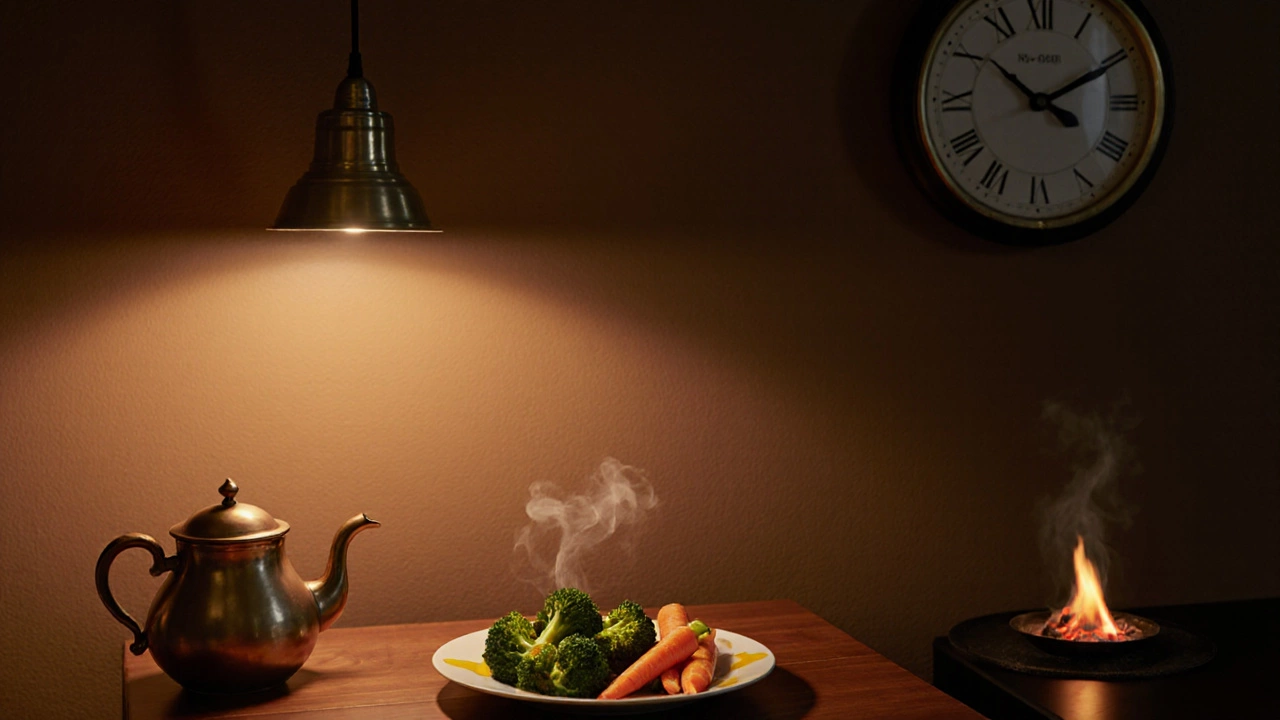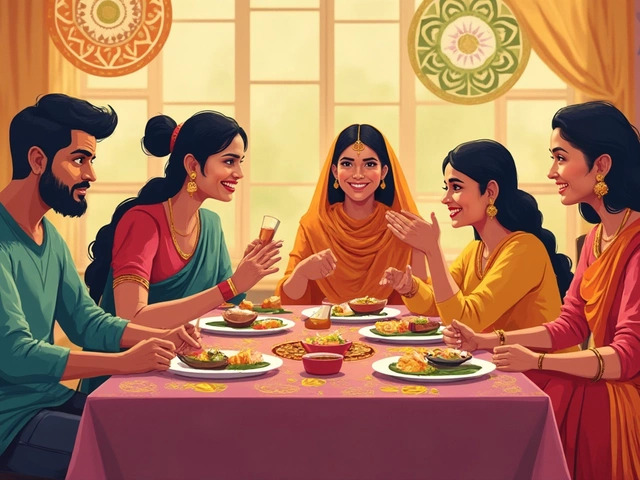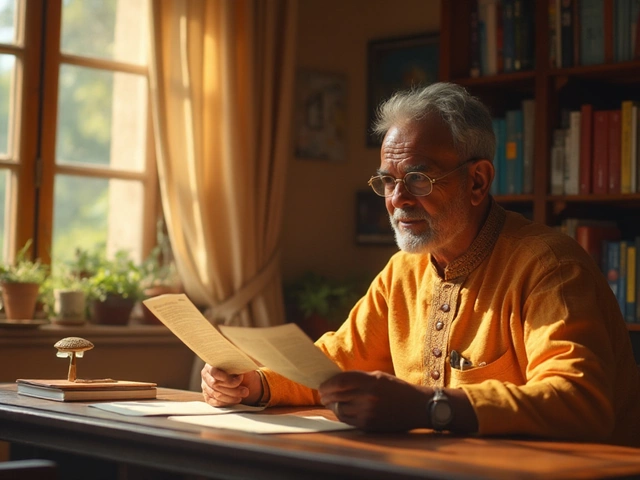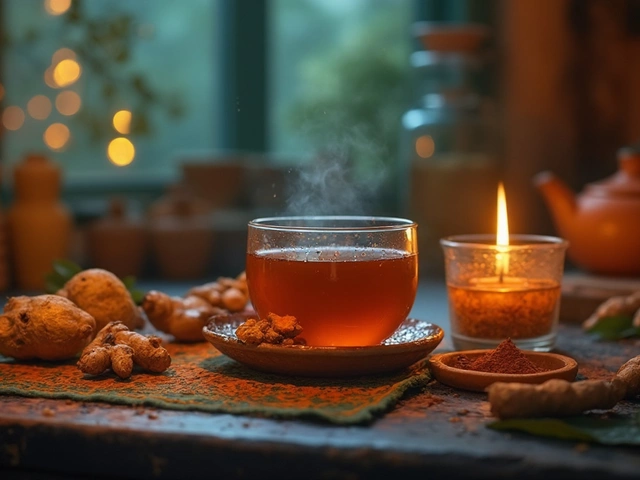
Ayurvedic Nighttime Food Checker
Check Your Nighttime Snack
Enter any food item to see if it's Ayurvedic-friendly for evening consumption. The tool analyzes based on Kapha, Pitta, and Vata dosha principles.
When it comes to staying energetic and sleeping soundly, what you eat after sunset can make a huge difference. In Ayurveda is a traditional Indian system of medicine that balances mind, body, and spirit through diet, lifestyle, and herbal therapies, evening meals are treated with special care because the body’s digestive fire-Agni-naturally slows down after dark. This article reveals the key foods you should steer clear of after dinner, explains why they disturb the doshas, and gives practical tips for a calm, restorative night.
Why Nighttime Digestion Matters in Ayurveda
Ayurveda divides the 24‑hour day into three 8‑hour windows, each dominated by one of the three doshas-Kapha, Pitta, and Vata. From 6pm to 10pm, Kapha is at its peak, promoting stability and lubrication, but also encouraging heaviness and sluggishness. During this Kapha window, Agni (the digestive fire) is at its lowest, meaning the stomach processes food slower than during the earlier Pitta and Vata phases.
If you load the stomach with heavy, hard‑to‑digest foods when Agni is weak, you risk:
- Acid reflux or bloating
- Disturbed sleep patterns
- Weight gain due to excess Kapha
- Reduced mental clarity next morning
Therefore, the Ayurvedic nighttime diet focuses on light, easy‑to‑digest meals that support the body’s natural rhythm.
Doshas and Their Influence on Evening Eating
Each dosha has distinct qualities that dictate which foods are harmonious or aggravating after dark.
| Dosha | Typical Traits | Foods to Avoid at Night |
|---|---|---|
| Kapha | Cold, heavy, oily | Heavy dairy, fried foods, sugary desserts |
| Pitta | Hot, sharp, oily | Spicy chilies, acidic tomatoes, alcohol |
| Vata | Dry, light, cold | Raw vegetables, caffeinated drinks, carbonated soda |
Even if you don’t know your exact dosha constitution, following these general rules helps keep Agni balanced.
Top Foods to Avoid After Dinner
Below are the most common culprits that clash with the low‑Agni window.
- Heavy Dairy Products-Whole milk, cheese, ice‑cream, and ghee are cooling and increase Kapha. They are difficult to break down when Agni is weak, often leading to mucus buildup and a feeling of heaviness.
- Sugary or Processed Sweets-Candies, pastries, and refined sugar spikes blood sugar quickly, then crashes during sleep, disrupting the body’s natural repair cycle.
- Caffeinated Beverages-Coffee, black tea, and energy drinks stimulate Vata, causing restlessness and night‑time awakenings.
- Alcohol-Even a small glass raises Pitta heat, irritates the stomach lining, and reduces the quality of REM sleep.
- Fried and Greasy Foods-French fries, pakoras, and deep‑fried snacks add excess oil, slowing digestion and increasing Kapha congestion.
- Spicy Chilies & Strong Condiments-Red pepper, mustard, and hot sauces amplify Pitta fire, making the stomach overly active when it should be calming.
- Raw Vegetables & Salads-While nutritious, raw fiber is tough on a waning Agni and can cause gas or bloating for Vata‑dominant people.
These items are best reserved for lunch or early afternoon when the digestive fire is stronger.
Safer Evening Options (What to Choose Instead)
If you need a snack after 6pm, pick foods that are warm, lightly cooked, and easy on the stomach.
- Steamed vegetables with a pinch of cumin and a drizzle of clarified butter (ghee)
- Warm herbal teas such as ginger, fennel, or chamomile
- Small portions of a cooked grain like quinoa or barley
- A handful of soaked almonds (remove skins) for healthy fats without Kapha overload
- Warm milk with a dash of turmeric (if dairy is tolerated) - a classic Ayurvedic bedtime beverage
These choices keep Agni modestly active without triggering excess Kapha, Pitta, or Vata.
Practical Tips for a Calm Nighttime Meal
- Eat early - Aim to finish dinner by 7pm to give at least 2‑hour gap before bedtime.
- Portion control - Keep dinner portions to about 25‑30% of your daily calorie intake.
- Cooked over raw - Lightly sauté, steam, or boil foods; avoid raw salads after dark.
- Warm, spiced lightly - Use mild spices like cumin, coriander, fennel, and a touch of ginger to aid digestion without overstimulating Pitta.
- Stay hydrated - Sip warm water or herbal tea, but avoid large amounts of liquid right before bed.
- Mindful eating - Chew slowly, sit upright, and focus on the meal; this supports Agni and reduces digestive errors.

Common Mistakes & How to Fix Them
Even seasoned eaters slip up. Here’s a quick fix guide.
- “I love late‑night coffee.” Switch to decaf herbal tea 30minutes before bed; adding a pinch of cardamom can mimic the ritual without caffeine.
- “I always have a big bowl of rice at dinner.” Reduce the serving size and pair with well‑cooked lentils and steamed veggies to balance the carb load.
- “Dessert is a must after dinner.” Replace refined sweets with a warm apple‑cinnamon compote - sweet, soothing, and easier on Agni.
- “I snack on chips while watching TV.” Choose roasted chickpeas seasoned with turmeric and black pepper for crunch without the heavy oil.
Quick Nighttime Food Checklist
- ❌ No whole‑milk cheese or ice‑cream after 6pm
- ❌ No caffeine or energy drinks after 4pm
- ❌ No fried, greasy snacks in the evening
- ❌ No spicy chilies or mustard sauces after dinner
- ❌ No raw salads or uncooked veggies late at night
- ✅ Warm, lightly spiced soups or steamed veggies
- ✅ Herbal teas (ginger, chamomile, fennel)
- ✅ Small portion of cooked whole grains
- ✅ Warm milk with turmeric (if dairy suits you)
Follow this list for a few weeks and notice improved sleep quality, lighter mornings, and a calmer digestive system.
Frequently Asked Questions
Can I have a small piece of dark chocolate after dinner?
A tiny square (under 10g) of high‑cocoa dark chocolate is usually fine if you have a strong Vata constitution, because the bitterness balances Kapha. However, avoid larger portions or chocolate with added milk and sugar, which can dampen Agni.
Is it okay to drink warm milk before bed if I’m lactose intolerant?
Switch to almond or oat milk warmed with a pinch of turmeric and cardamom. The warm spice supports digestion, while the plant‑based milk avoids the lactose issue.
How long should I wait after eating before I go to sleep?
Aim for a 2‑hour gap. This gives Agni enough time to finish the bulk of digestion, reducing the risk of reflux and promoting deeper sleep.
I’m a night‑shift worker. Should I follow the same rules?
Adjust the timing to your work schedule. The key is to keep the last big meal at least 2‑3 hours before you try to sleep, and keep it light, warm, and low in Kapha‑heavy foods.
Why does raw salad cause bloating at night?
Raw fiber is tough to break down when Agni is low. The body ferments it in the colon, producing gas. Lightly sautéing the veggies makes them easier to digest while retaining nutrients.





Rohan Talvani
I am a manufacturing expert with over 15 years of experience in streamlining production processes and enhancing operational efficiency. My work often takes me into the technical nitty-gritty of production, but I have a keen interest in writing about medicine in India—an intersection of tradition and modern practices that captivates me. I strive to incorporate innovative approaches in everything I do, whether in my professional role or as an author. My passion for writing about health topics stems from a strong belief in knowledge sharing and its potential to bring about positive changes.
view all postsWrite a comment